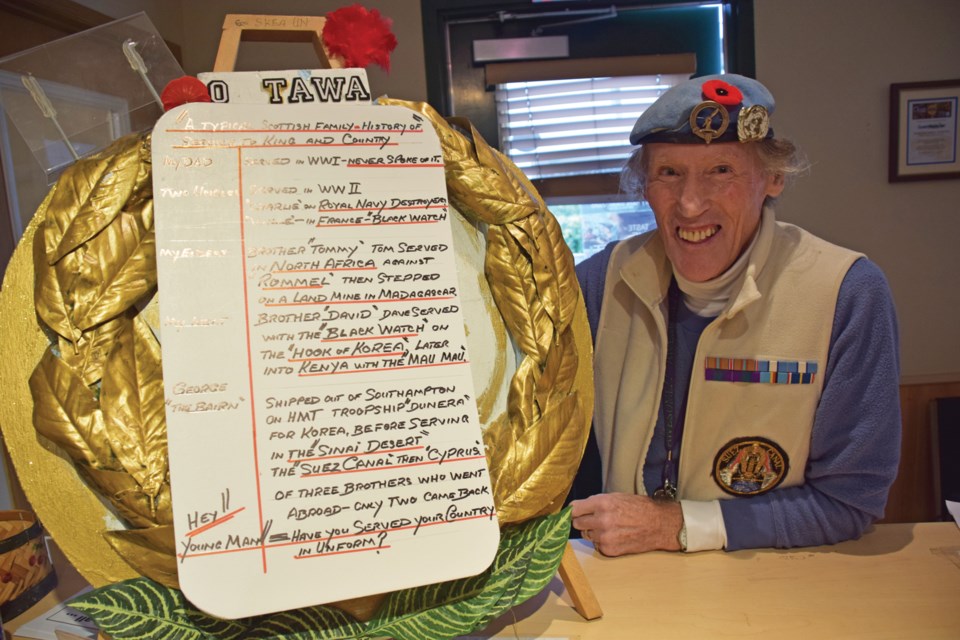George Skea of Hopkins Landing was standing across the front counter in his beret and dealing out hundred-dollar bills. I was laughing so hard I almost bust a gut.
George had come into the office carrying an elaborate carved wreath dedicated to the men in his line, “a typical Scottish family,” who had served in uniform abroad. He’d placed it the previous day under the cenotaph in Gibsons during the Remembrance Day ceremony.
He handed me a copy of a letter. I read it a couple of times, no doubt frowning. The upshot: he wasn’t too impressed with some of the other wreaths that were laid in Gibsons – “those circles of BROWN or BLACK PLASTIC. No Name who they grieved, NO writing ever … NO NAME of who placed this circle of junk. What an insult to our veterans.”
“How old are you, George?” I asked.
“Eighty-four,” he said.
“One year younger than Don Cherry,” I said.
It didn’t get a reaction.
I told George that I couldn’t see me running the letter, that it would deeply upset some people – unfair generalizations can have that effect – but that I would like to take a photo of him and his beautiful wreath.
George wanted a little more than that. He wanted the photo and his “wee statement” to appear on the front page. He wanted the whole front page.
I said I couldn’t do that. And that’s when the envelope full of hundreds came out. He started counting them into a neat pile.
Once I had my laughter under control, I told him that no, seriously, we couldn’t.
“But you did it for the Lady Rose,” he said.
“That was news,” I said. “We don’t sell editorial space.”
“Ah sure,” he said with a rascally Tommy grin. He reached back into the envelope and pulled out another wad of hundreds and started adding them to the pile.
It was one of the funniest encounters I’ve had in more than 30 years of newspapers. In the end, George was more shocked than angry or sad when I refused to take his money. He emailed me a note that evening (subject line: “Pieces of junk … John … pieces of junk”) saying it wasn’t too late, we could still make the deal. I sent him back a link to our website, where we’d posted a photo of him and his wreath with the header: “For king and country.”
George’s visit, coming on the heels of the firing and public shaming of Don Cherry, got me thinking about these crusty characters who are now in their 80s. We have a few of them on the Sunshine Coast.
The rhyming Albert Reeve, 83 at last report, gets a rise out of some of our readers with his occasionally grumpy couplets. In one verse called Ode to Eighties he compares his vantage point to that of young whippersnappers in their 50s, for whom life is cool and working hard is the golden rule. “Eighties know the fifty race,” he ends knowingly. “Fifties don’t get eighty place.”
A Russian gentleman, also in his 80s, told me last year that Canada, with its political correctness and hardening intolerance to wrongthink, was getting almost as bad as the Soviet Union he escaped from many decades ago. Death, he suggested with black Russian humour, was looking better every day.
Which brings us to Don Cherry, who was sacked from Hockey Night in Canada by Sportsnet on Remembrance Day for scolding “you people … that come here” for not wearing the poppy. Cherry, who made a very successful TV career out of being bombastic and boorish, crossed a line too far and had to be shut up and then ritually denounced by the virtue signal corps in the national media.
Cherry is part of the so-called Silent Generation. He was born in 1934, within weeks of Jean Chrétien and Gloria Steinem and within months of Shirley MacLaine and Elvis Presley. Forget boomers; this was the first fully woke generation, who normalized inclusion and pioneered social activism. And since virtually all of the big “classic rock” figures were born at the tail end of the period, they were hardly silent. When it came to building an equal society, this cohort did much of the heavy lifting. They get almost no credit for it.
Now they’re getting up in their 80s and, like all elders, are deserving of patience, consideration and respect. I’ve never had the slightest use for Don Cherry, but what he said was far less contemptible than the piling on he’s received. To his credit, he did not apologize but said he regretted his choice of words and should have aimed his patriotic barb at “everybody” instead of “you people.” He’s 85. He’s part of a generation that defined human decency in today’s terms. He’s done a lot of good and it far outweighs one of his many over-the-top comments.
When George Skea was leaving the office Tuesday, I stepped outside with him and said, “People are more important than what they say.” He didn’t disagree.
I certainly enjoyed his visit.
